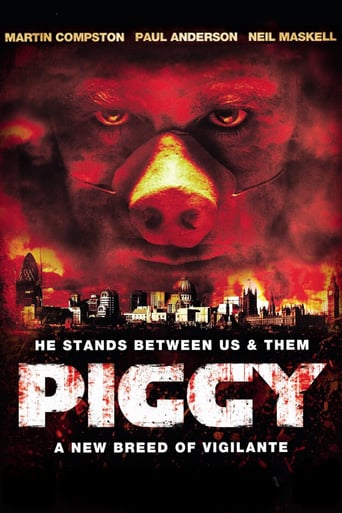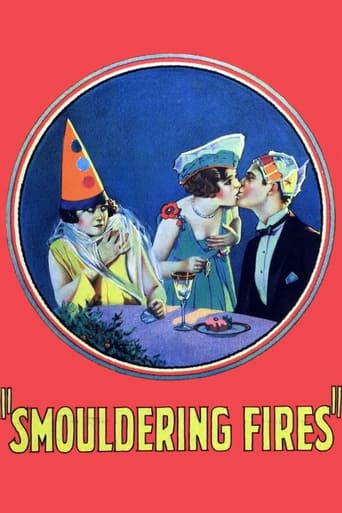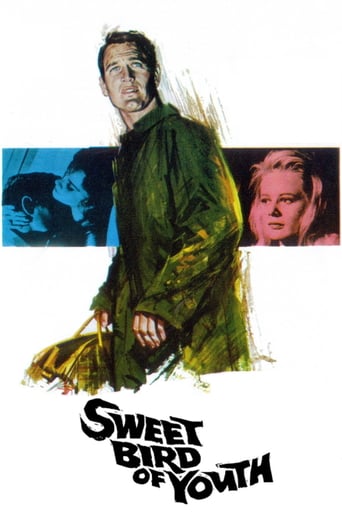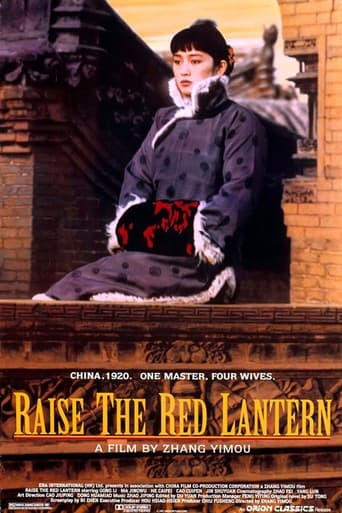


Raise the Red Lantern
In 1920s China, a nineteen year old Songlian is forced to marry the much older lord of a powerful family and compete with his three wives for his attention, slowly uncovering the dark truths that lie within their gilded cage.
-
- Cast:
- Gong Li , Ma Jingwu , He Saifei , Cao Cuifen , Kong Lin , Shuyuan Jin , Ding Weimin


Similar titles
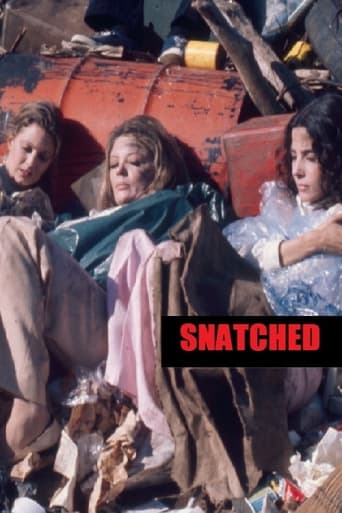
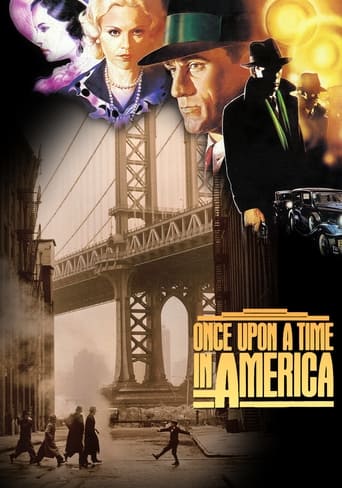
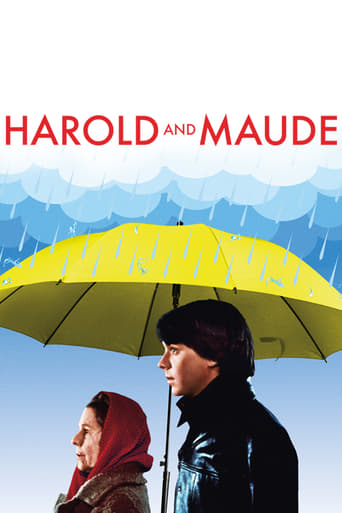
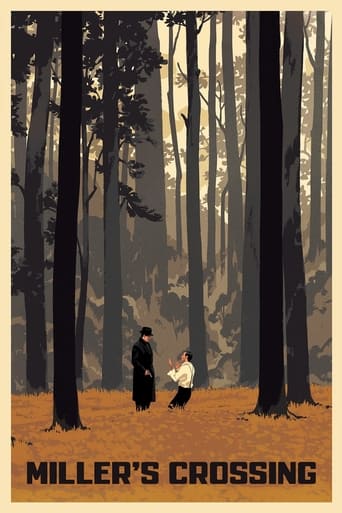
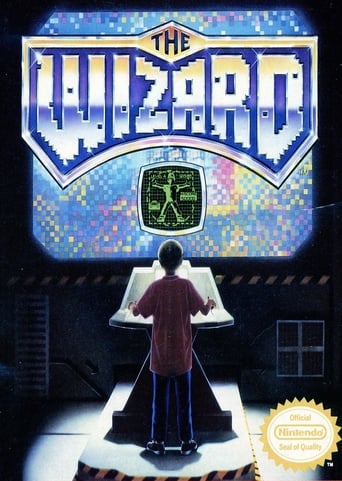
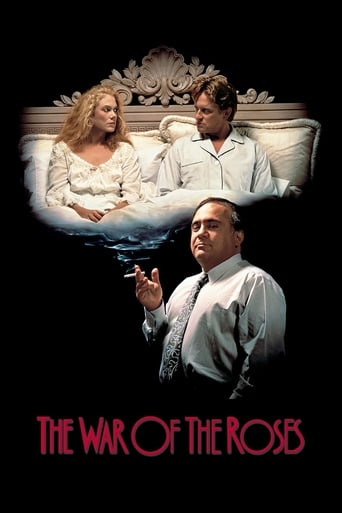




Reviews
Sadly Over-hyped
This is one of the few movies I've ever seen where the whole audience broke into spontaneous, loud applause a third of the way in.
Although I seem to have had higher expectations than I thought, the movie is super entertaining.
There are moments that feel comical, some horrific, and some downright inspiring but the tonal shifts hardly matter as the end results come to a film that's perfect for this time.
Chinese auteur Zhang Yimou's fourth feature, Venice's Silver Lion winner and an Oscar BEST FOREIGN LANGUAGE FILM nominee, RAISE THE RED LANTERN, first and foremost, emblazons Zhang's indubitable sense of form as a cinematic aesthete by curtailing the whole shebang within the perimeter of a palatial residence (the Qiao Family compound near Pingyao, Shanxi Province) in the Warlord Era China of the early 20th Century, and vetting women's tragic life immured inside a feudal prison with a fine-tooth comb.Songlian (Gong Li), a 19-year-old college-dropout, marries into the wealthy Chen Family as the fourth wife (or the third concubine), and soon is embroiled into the harem's backdoor maneuver, validated by the lantern-lightening ritual vouchsafed by Master Chen (Ma Jingwu) - whose face is never shown in close-up, a bold generalization pregnant with Zhang's tacit swipe at the draconian patriarchy's clutches - to indicate which wife he intends to spend the night with and is concomitant with privileges like sensual foot massage and preferential culinary options vested to the cherry-picked one.With the exception of Chen's first wife, the scraggly Yuru (Jin Shuyuan), who is long in the tooth and has become philosophical towards her long-gone heyday, the quotidian contest revolves around Songlian, Meishan (He Saifei), the third wife, a cosseted former Peking opera star who sub rosa engages in an illicit affair with the family doctor, and Zhuoyun (Cao Cuifen), the second wife, a Buddha-faced, scorpion-hearted figure, who befriends Songlian with an ulterior motive to exact. As the surrogate of audience, Songlian enters Chen's household with "those who know nothing fear nothing" assertiveness that we all obligatorily root for her ascendancy among the medieval hierarchy, but as she realizes before long, those backhanded plotting is nothing but futile attempt, those wives are merely disposable accessories of their husband, vessels of procreation. She can neither deign to Zhuoyun's total submission to this polygamous anomaly nor become rebellious enough like Meishan, who dares to cross that dangerous line to stake her claim as an individual being, in the event, assailed by the collective onslaught of guilt, despair, disillusion and shock in the wake of witnessing a brutal murder, she is no longer compos mentis. In the byplay, the friction between she and her mulish maid Yan'er (Kong Lin), who harbors a pipe dream of becoming her master's mistress and holds a none-too-subtle grudge over Songlian, is even more tragic because what adds insult to injury is the insuperable chasm caused by classism, that completely antagonizes those two girls of similar age, on the strength of false hope and mean-spirited vengeance. A high-octane Gong Li is par excellence to headline this sublimely arranged female-oriented melodrama, exhibiting a staggering disintegration of Songlian's headstrong persona through smoldering emotional shifts, and rounds out the show with a bang in the coda: business as usual in the family's fiefdom, only she has devolved into a living-ghost perennially and obliviously wandering the courtyard, seems to apprise her unwitting successor of a buried tragedy, which like as not will repeat again. Among the supporting players, He Saifei impresses with her stupendous opera posture and a friend-or-foe intrigue that occasions a precious if elusive sense of solidarity that is essential to the film's feminist slant; on the opposite of the gamut, veteran actress Cao Cuifen, intriguingly excels in exemplifying the artificiality of sororal rapport.It goes without saying that RAISE THE RED LANTERN owes its appreciable renown as much to its performers as those behind the camera, namely, the rigidly-framed, chromatically stunning cinematography from Zhao Fei and Yang Lun that falls in line with a unique color scheme out of Zhang's ingenious conception, and the aural pleasure engendered by the oriental strains masterly composed by Zhao Jiping along with shrill Chinese opera snippets, honing the trenchant strength of this benightedness-censuring, universally allegorical tale that judiciously scrutinizes womanhood in its dead center.
Zhang Yimou's Academy Award-nominated "Da hong deng long gao gao gua" ("Raise the Red Lantern" in English) is one of the many movies that sets up why China is like it is today. In this case, the focus is the plight of a woman in the Warlord Era. Songlian (Gong Li) is forced to become a concubine for a wealthy man. She is his fourth mistress. Each mistress lives in her own compound, and the lantern of his chosen mistress for the night gets lit. Tension is bound to arise, especially since not every mistress gets equal treatment.The movie is a look at the master's superficial world, and the pseudo-luxury that the mistresses enjoy. The rooms themselves may be colorful, but the compound itself is just as dismal as the mistresses' lives. The unusual blend of colors and music creates a movie like few others. You don't have to know all about China's history to understand what a fine piece of work this is. I recommend it.
Raise The Red Lantern demonstrated the importance of Chinese cinema. Luscious use of colour, photography and setting it in the past meant you could use symbolism to make coded criticisms of China today without or hopefully not raising the eyebrow of the censor.Our protagonist Songlian is a 19 year old woman in 1920s China, beautiful and educated. When her father dies her step mother sells her as a concubine to her wealthy master. She is the fourth mistress and when the red lantern is lit outside her house, it signifies that the master will spend the night with her and she will be treated royally.The master has four wives, the first is older, maybe around his age and she has bore him a child but is largely forgotten. At her age she knows she cannot arouse the interest of the master.The film is almost soap opera like as the other wives compete for the interest of the master and this means conspiring, being petty and mean. It leads to tragic results and Songlian distils that this is a game where the women cannot win. As the wives get older the master will find a younger model with something different that interests him. She retreats into solitude.Director Zhang highlights the lack of power women had in the past in this Confucian orientated society but also shows what could happen to you if you did not play by the rules in an archaic system.
Raise the Red Lantern is directed by the well known Chinese director Zhang Yimou. Zhang has created a piece of work that is rich with symbolism. His use of colour and differing camera angles capture the unspoken emotions and atmosphere constantly surrounding the narrative. Raise the Red Lantern reflects on Confucian attitudes and the welfare of women under this regime. Zhang uses cultural tradition to critique the past. While this tradition serves its purpose in the film it must be recognised as a conscious attempt by Zhang to self-orientalise. His use of hyper-real traditions further demonstrates his need to emphasise the exotic and make the film appealing to an international audience. Colour is used throughout the film to create atmosphere, depict emotions and symbolise power. Zhang has a history of using the colour red in his films. In Raise the Red Lantern I believe the colour red is used to symbolise power and also the lack of power. Each evening all the mistresses must line up outside their houses to await the master's choice of who he will spend the night with. The mistress who is chosen is presented with a glowing red lantern at her doorway and the approach to her house is lit by red lanterns. This display of red gives power to one over the many. With the honour associated with being chosen to lie with the master comes power of choice over the other mistresses and servants. The chosen mistress may choose what food is prepared for all, where she will eat it and can demand usually unobtainable services from servants and mistresses alike. In this instance the colour red is a symbol of power for the mistress. In the same instance this colour red can be interpreted as a lack of power for the mistress. The red lantern being presented to the mistress could also represent her powerlessness over choice. She has been chosen by the master to sleep with him; she has no say in this decision and must subject to his will. Yet another reading of this symbol is that of the western notion of a red light representing prostitution. A common symbol of prostitution in the west is having a red light over the doorway and lends to the name "red light district". This western understanding of the colour red may have been adopted by Zhang in this film to further its understanding and appeal to western audiences. For when you review the way in which the mistress is chosen, is used as a tool to gratify the man and then left at his discretion, it has many similarities to prostitution. Contrasting the bright colour red is the muted backdrop of subdued hues of Grey. This backdrop creates a sense of melancholy and impending despair. It also highlights the bright red of the lanterns, furthermore emphasising whoever has the lanterns importance and power over the rest. I believe that the lanterns themselves are also very symbolic in the film. The lanterns are the lifeblood of the female characters in the film. When the lanterns are lit the characters have hope and life, when they are out they live in despair. When Songlian is found to have tricked the master about being pregnant her lanterns are not only put out but also covered. This symbolises her hope being quashed, she is from then on ignored by the master, left to live in the muted background and fated to turn mad. Another example of the lantern symbolising hope and life is with Ya'ner . Ya'ner steals lanterns to try and emulate the hope and life that the mistresses enjoy. When Ya'ner is found out she is forced to kneel in the snow while her lanterns are burnt in front of her. This symbolises her hopes, dreams and life being destroyed. She dies after this episode. Raise the Red Lantern is also a critique of the not so distant Confucian society that dominated China for over a thousand years. Zhang focuses his portrayal of Confucian values on the power relationship between genders. Such examples are evident throughout the film. The husband in the film, only ever referred to in the film as "the master", is the patriarch and untouchable. The master has four wives/mistresses and has the power to call on any one of them to fulfil his needs. His mistresses have no choice in when or how they are chosen, they are treated as objects not as people. The fact that he is married to all four women and yet they are never referred to as his wives is an example of their lack of power and status. Zhang uses two characteristics common to Fifth generation film makers in his telling of Raise the Red Lantern. Both self-orientalising and hyper-real situations are evident throughout the film. Zhang purposely over exaggerates many of the cultural practices and the extent of their influence. He does this to draw attention and make the film more exotic and enthralling to an international audience. He focuses on the negative and brutal aspects of Confucian society to perpetuate the western belief that Chinese society is brutal and archaic. In his attempt to make the film more exotic he also creates hyper-real customs that he sells as authentic. Key depictions such as the use of the red lanterns, the use of the voodoo doll by the servant and the 'traditional' foot massage are examples of an imagined culture created for the benefit of the viewer. Raise the Red Lantern is a gripping, emotional and vivid critique of Confucian society. It makes use of extensive symbolism to enhance the narrative and further the viewers understanding of key themes. Zhang has focused on gender power relations, in particular the lack of power women were afforded in Confucian society. He has used traditional as well as hyper-real cultural practices to emphasise and highlight the moral miss-comings of Chinese culture and in effect has reinforced western views of cultural supremacy.

